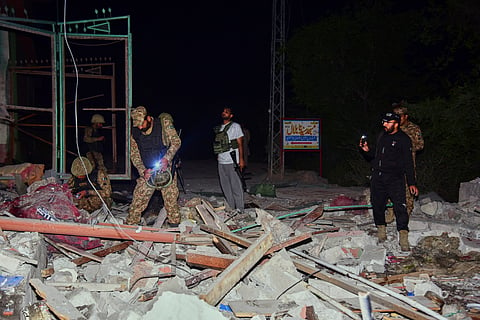

Was this strike expected? Absolutely. There was no option. Public pressure, amplified by media and social platforms, left little room for inaction. Even if this incident saw fewer casualties than Pulwama, its emotional impact demanded a response. And we’ve responded — properly, proportionately, and with purpose.
Whether we hit one metre or a hundred kilometres inside Pakistan doesn’t really matter. From the enemy’s perspective, a strike is a strike. But the fact that we hit so deep symbolises the strength of our resolve — that we are willing to go any distance to target terror infrastructure.
This strike oozed even more symbolism. The name Sindoor, the videos that followed, the presence of two lady officers making the announcement — all of it added weight. It reflected careful planning. In the two weeks leading up to it, we prepared thoroughly. Every aspect seemed well thought through — militarily and symbolically. The operation demonstrated not just capability, but clarity of intent.
India hasn’t merely reacted emotionally. We’ve tried to place this strike within a broader international context. Our goal was to highlight the long-standing and well-documented link between Pakistan and terrorism. Of course, direct evidence is difficult to furnish in such a compressed time frame, but there is abundant corroborative and circumstantial material. The global community is not unaware of this history. In fact, just days ago, Pakistan’s own foreign minister acknowledged — while attempting to deflect blame onto the West — that the country had supported terrorism.
We executed what I’d call a classical punitive strike. No civilian or military targets were touched. We didn’t violate their airspace, land borders, or maritime lines. We hit what we had identified as sources of terror, and made it clear that our objective was to enforce behavioural change. It wasn’t escalation — it was deterrence. We signalled that if behaviour does not change, we are prepared to act again, harder and deeper.
Now, Pakistan is under immense pressure to retaliate. Their army survives on the self-fashioned myth that it is the sole protector of the nation from India. If it doesn’t respond, its internal standing collapses. And that is a threat they take seriously. A response, in my opinion, is 100 per cent likely — unless there is overwhelming international pressure forcing restraint.
But here’s their dilemma: what do they hit in return? We targeted non-military, non-civilian sites — infrastructure linked to terror. They have no equivalent in India. They can’t point to “Indian terror camps” because there aren’t any. So they must manufacture an equivalent — perhaps by targeting a military site and then claiming parity. It’s not unprecedented. After Balakot, they dropped bombs near a brigade headquarters, making a point without actually escalating.
If they try that again and we exercise restraint, the situation may de-escalate. But if we respond again, then anything is possible. The direction this takes depends not just on their next move, but also on how we respond to it. The tempo of events, once set by the first strike, shifts to the adversary. After that, your contingency plans kick in. You no longer plan — you act.
No one should be under any illusion that this strike will end terrorism. At best, it offers a temporary disruption. We’ve conducted similar actions in the past. But the truth is, we’ve often lacked the long-term strategic investments needed to sustain leverage. Take something as basic as water. We’ve spoken of using water as a pressure point, yet never built the dams that would make such leverage credible. It’s one thing to say “I’ll hit you” — another to have the hands to actually do it.
The real strategic play lies in weakening the Pakistani Army’s domestic stranglehold. The military controls more than 60 per cent of their economy, operates above civilian accountability, and sustains itself through external conflict narratives. If that grip is loosened, reform becomes possible. But democracies like ours often struggle with long-term continuity. Election cycles make sustained strategic pressure difficult.
Pakistan, meanwhile, is grappling with internal fissures — ethnic fault lines, separatist rumblings, and shortages of essentials like power and food. Public anger is simmering. The only glue the army has is the external enemy. That’s why they’ll respond — not to win, but to survive.
As for outside players — yes, some may look to fish in troubled waters. China, for example, may offer Pakistan surveillance, cyber support, or maritime intelligence. But they will likely stop short of any action that endangers their own infrastructure investments in PoK. Bangladesh’s recent gestures should be viewed as transitional. Geography ensures they remain tied to India. Russia might play a moderating role with China, and the US — distracted and cautious — is keeping things neutral. Turkey’s warship is more theatre than threat. These are symbolic moves in a region familiar with shadow play.
On the home front, India’s institutional strength is showing. Even as the strike was being carried out, newspapers led with headlines on UK-India relations. This was not a moment of paralysis. Diplomacy and governance went on. The armed forces delivered — with precision and purpose. India has responded before, sometimes overtly, sometimes in the shadows. But this time, it was visible, intentional, and carefully calibrated. We’ve sent a message. Now, the next move — and the one after — will decide what kind of chapter this becomes.
(Commodore G Prakash (Retd) is an Indian Navy veteran and specialist in aviation and anti-submarine warfare. As told to Ronnie Kuriakose.)